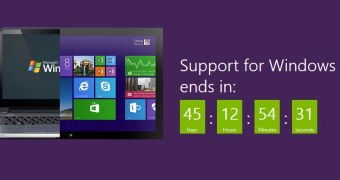Windows XP support will come to an end on April 8, but many users are very likely to remain on this particular OS version, including major banks across the world.
The Federal Financial Institutions Examination Council issued a warning to emphasize that Windows XP’s end of support could cause quite a lot of issues, which would affect not only the banks themselves, but also their customers.
“Potential problems include degradation in the delivery of various products and services, application incompatibilities, and increased potential for data theft and unauthorized additions, deletions, and changes of data,” the warning issued today reads.
“Additionally, financial institutions and TSPs that are subject to the requirements of the Payment Card Industry Data Security Standard (PCIDSS) and continue to use XP after April 8, 2014, may no longer be compliant.”
The FFIEC also recommends financial institutions to perform risk assessment studies and then select appropriate mitigations and conduct planning to make sure that all their computers and date will be on the safe side once Microsoft removes support for Windows XP.
“Monitor the risk mitigation implementation to ensure that the level of risk is acceptable. The effectiveness of controls should be tested periodically and results reported to senior management or a committee of the board of directors, as appropriate, to ensure risk continues to be managed,” it said.
Without support, Windows XP machines will no longer receive updates and security patches, which means that vulnerabilities won’t be fixed and would leave an open door for hackers trying to exploit specific computers.
“After 12 years, support for Windows XP will end on April 8, 2014. There will be no more security updates or technical support for the Windows XP operating system. It is very important that customers and partners migrate to a modern operating system such as Windows 8.1,” Microsoft noted.
Windows XP is right now powering 29 percent of desktop computers worldwide, which is a clear sign that the operating system won’t be retired completely before April 8.

 14 DAY TRIAL //
14 DAY TRIAL //